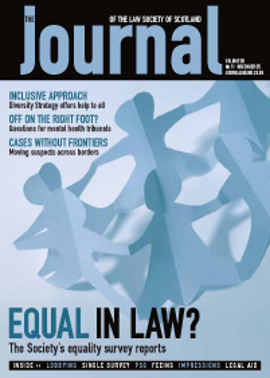Divorcing the divorced

Ali v Ali (No 3) 2003 SLT 641 is a well known illustration of the problems that can arise where a defender attempts to reopen divorce proceedings in which decree was originally obtained on an undefended basis. Another recent example is provided by the case of Ahmed v Ahmed, in which the Inner House issued an opinion on 13 October 2005.
Ahmed concerns a couple who married in Pakistan in 1979 and subsequently lived in Scotland for a number of years. The parties separated in November 1988. In May 1989, the husband obtained a divorce in Pakistan by means of talaq.
It would have been open to the wife to accept this divorce and to seek financial provision through the Scottish courts in terms of the Matrimonial & Family Proceedings Act 1984 – provided, of course, that she commenced those proceedings within five years from the date of the talaq divorce.
Divorced or not?
However, the wife elected not to follow that route. Instead, she raised her own divorce proceedings in the Court of Session in 1989 seeking, inter alia, orders for financial provision. The husband defended the divorce action on its merits, arguing that it was incompetent as the parties were already divorced in Pakistan and that divorce fell to be recognised as valid in Scotland. The wife averred that the divorce relied on by her husband was ineffective under the law of Pakistan and could not be recognised in Scotland. Accordingly, the husband raised an action in the Lahore High Court seeking declarator of the validity of the Pakistani divorce. The Scottish divorce action was sisted pending the outcome of this application.
The sist in the Scottish proceedings was recalled in July 1992. At that time, the Pakistani action for declarator remained unresolved. Since the defender was by this stage residing in the USA, the wife enrolled a motion ordaining him to sist a mandatory who would be personally liable for any expenses which he might be found liable to pay. The husband was unable to sist a mandatory and so, after sundry procedure, the wife’s divorce was allowed to proceed as undefended. In May 1994, following an undefended proof, the wife was awarded decree of divorce, custody of the parties’ children, provision for their maintenance, a capital sum of £65,000 and expenses. She set about attempting to enforce payment. To make matters more complicated, the husband had remarried in 1992. The Lahore High Court finally determined that the talaq divorce had indeed been valid, in October 1994.
The husband’s response
The husband eventually raised an action of reduction in the Court of Session in 2000, no doubt in response to ongoing attempts to enforce payment, arguing that the divorce granted in 1994 was ultra vires of the court, and “an inherent nullity”, given the parties were already divorced at the time decree was pronounced. Following a proof in the reduction action, the Lord Ordinary held it established that the talaq divorce had been valid according to the laws of Pakistan and thus was regarded as valid according to the law of Scotland. The Court of Session divorce decree was reduced (together with the related orders). The Lord Ordinary considered whether he could split the decree into its constituent parts and reduce the decree of divorce whilst leaving the financial orders standing. However, he concluded that this could not competently be done, since the capital sum order had been awarded under the Family Law (Scotland) Act 1985 and was thus inextricably bound up with the divorce itself.
Error not enough
The wife reclaimed to the Inner House and succeeded in overturning the decision. In rejecting the husband’s argument, the Inner House concluded that the divorce decree was not a fundamental nullity simply by reason of the fact that it was pronounced in error as to the true position. Comparison was drawn with the situation in which an award of aliment is made in favour of a child, proceeding on the erroneous basis that the defender is the child’s parent (Philp v Reid 1927 SC 224). Such an award does not go to the vires of the court, nor does it give rise to any fundamental nullity.
This case serves to underline the formidable obstacles facing a litigant who seeks to reduce a decree relating to status. The Inner House’s decision no doubt came as a considerable relief to the wife, who would have been too late by this stage to have sought financial provision afresh in terms of the 1984 Act.
Rhona Adams, Partner in the Morton Fraser Family Law Team. e: rhona.adams@morton-fraser.com
In this issue
- Changing perceptions
- A need undiminished
- Steps forward
- A better way to work
- Combatting the cross-border criminal
- Seen to be fair?
- The lobbying game
- A favoured model?
- A grand day out
- A window of opportunity
- Don't fall at the final hurdle
- Practice guideline: form of accounts and taxation
- Advice for All: the Society's response
- Matter for debate
- Divorcing the divorced
- Uncommon commencement dates
- Scottish Solicitors' Discipline Tribunal
- Website review
- Book reviews
- Still thumbs down
- Search and copy fees changing
- Common currency






